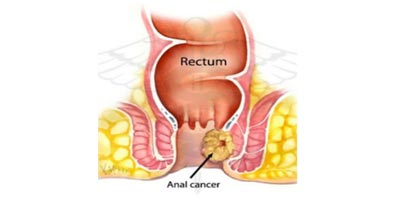
Anal cancer is an uncommon type of cancer that occurs in the anal canal. The anal canal is a short tube at the end of your rectum through which stool leaves your body.
Anal cancer can cause signs and symptoms such as rectal bleeding and anal pain.
Most people with anal cancer are treated with a combination of chemotherapy and radiation. Though combining anal cancer treatments increases the chance of a cure, the combined treatments also increase the risk of side effects.
Anal cancer signs and symptoms include:
Anal cancer forms when a genetic mutation turns normal, healthy cells into abnormal cells. Healthy cells grow and multiply at a set rate, eventually dying at a set time. Abnormal cells grow and multiply out of control, and they don’t die. The accumulating abnormal cells form a mass (tumor). Cancer cells invade nearby tissues and can separate from an initial tumor to spread elsewhere in the body (metastasize).
Anal cancer is closely related to a sexually transmitted infection called human papillomavirus (HPV). Evidence of HPV is detected in the majority of anal cancers. HPV is thought to be the most common cause of anal cancers.
Several factors have been found to increase the risk of anal cancer, including:
Anal cancer rarely spreads (metastasizes) to distant parts of the body. Only a small percentage of tumors are found to have spread, but those that do are especially difficult to treat. Anal cancer that metastasizes most commonly spreads to the liver and the lungs.
Tests and procedures used to diagnose anal cancer include:
Once it’s confirmed that you have anal cancer, your doctor works to determine the size of the cancer and whether it has spread — a process called staging. Determining your cancer’s stage helps your doctor determine the best approach to treating your cancer. Tests and procedures used in the staging of your cancer may include:
Your doctor uses the information from the procedures to assign your cancer a stage. The stages of anal cancer are:
What treatment you receive for anal cancer depends on the stage of your cancer, your overall health and your own preferences. Combined chemotherapy and radiation.
Doctors usually treat anal cancer with a combination of chemotherapy and radiation. Combined, these two treatments enhance each other and improve chances for a cure.
Chemotherapy. Chemotherapy drugs are injected into a vein or taken as pills. The chemicals travel throughout your body, killing rapidly growing cells, such as cancer cells. Unfortunately they also damage healthy cells that grow rapidly, including those in your gastrointestinal tract and in your hair follicles. This causes side effects such as nausea, vomiting and hair loss.
Radiation therapy. Radiation therapy uses high-powered beams, such as X-rays, to kill cancer cells. During radiation therapy, you’re positioned on a table and a large machine moves around you, directing radiation beams to specific areas of your body in order to target your cancer. Radiation may damage healthy tissue near where the beams are aimed. Side effects may include skin redness and sores in and around your anus, as well as hardening and shrinking of your anal canal.
You typically undergo radiation therapy for anal cancer for five or six weeks. Chemotherapy is typically administered during the first week and the fifth week. Your doctor tailors your treatment schedule based on characteristics of your cancer and your overall health. Though combining chemotherapy and radiation increases the effectiveness of the two treatments, it also makes side effects more likely.
Doctors typically use different procedures to remove anal cancer based on the stage of the cancer:Surgery to remove early-stage anal cancers. Very small anal cancers may be removed through surgery. During this procedure, the surgeon removes the tumor and a small amount of healthy tissue that surrounds it.
Because the tumors are small, early-stage cancers can sometimes be removed without damaging the anal sphincter muscles that surround the anal canal. Anal sphincter muscles control bowel movements, so doctors work to keep the muscles intact. Depending on your cancer, your doctor may also recommend chemotherapy and radiation after surgery.
Surgery for late-stage anal cancers or anal cancers that haven’t responded to other treatments. If your cancer hasn’t responded to chemotherapy and radiation, or if your cancer is advanced, your doctor may recommend a more extensive operation called abdominoperineal resection, which is sometimes referred to as an AP resection. During this procedure the surgeon removes the anal canal, rectum and a portion of the colon. The surgeon then attaches the remaining portion of your colon to an opening (stoma) in your abdomen through which waste will leave your body and collect in a colostomy bag.
There is no sure way to prevent anal cancer. In order to reduce your risk of anal cancer:
To book your appointment with a gastro surgeon, please reach out to us on +91 8160650099

